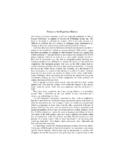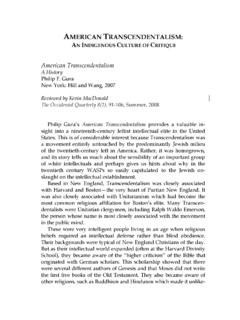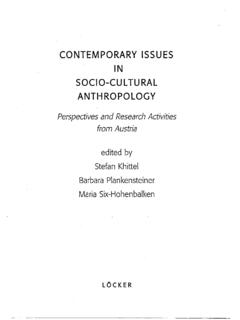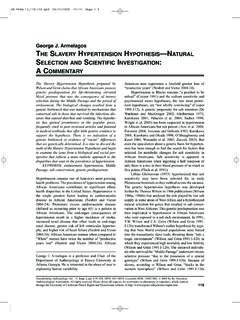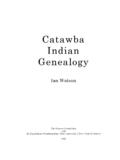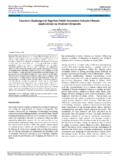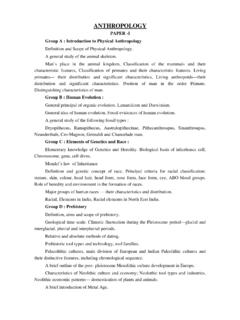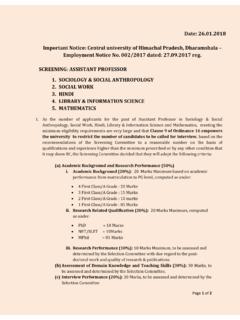Transcription of The Boasian School of Anthropology and the …
1 2 The Boasian School of Anthropology and the Decline of Darwinism in the Social Sciences If .. we were to treat Margaret Mead s Coming of Age in Samoa as uto-pia, not as ethnography, then we would understand it better and save a lot of pointless debate. (Robin Fox 1989, 3) Several writers have commented on the radical changes that occurred in the goals and methods of the social sciences consequent to the entry of Jews to these fields (Liebman 1973, 213; see also Degler 1991; Hollinger 1996; Horowitz 1993, 75; Rothman & Lichter 1982).
2 Degler (1991, 188ff) notes that the shift away from Darwinism as the fundamental paradigm of the social sciences resulted from an ideological shift rather than from the emergence of any new empirical data. He also notes that Jewish intellectuals have been instrumental in the decline of Darwinism and other biological perspectives in American social science since the 1930s (p. 200). The opposition of Jewish intellectuals to Darwinism has long been noticed (Lenz 1931, 674; see also comments of John Maynard Smith in Lewin [1992, 43]).
3 1In sociology, the advent of Jewish intellectuals in the pre World War II period resulted in a level of politicization unknown to sociology s founding fathers. It is not only that the names of Marx, Weber, and Durkheim replaced those of Charles Darwin and Herbert Spencer, but also that the sense of America as a consensual experience gave way to a sense of America as a series of conflicting definitions (Horowitz 1993, 75). In the post World War II period, sociology became populated by Jews to such a degree that jokes abounded: one did not need the synagogue, the minyan [ , the minimum number of Jews required for a communal religious service] was to be found in sociology departments; or, one did not need a sociology of Jewish life, since the two had become synonymous (Horowitz 1993, 77).
4 Indeed, the ethnic conflict within American sociology parallels to a remarkable degree the ethnic conflict in American Anthropology that is a theme of this chapter. Here the The Culture of Critique 22 conflict was played out between leftist Jewish social scientists and an old-line, empirically oriented Protestant establishment that was eventually eclipsed: American sociology has struggled with the contrary claims of those afflicted with physics envy and researchers .. more engaged in the dilemmas of society.
5 In that struggle, midwestern Protestant mandarins of positivist science often came into conflict with East Coast Jews who in turn wrestled with their own Marxist commitments; great quantitative researchers from abroad, like Paul Lazarsfeld at Columbia, sought to disrupt the complacency of native bean counters. (Sennett 1995, 43) This chapter will emphasize the ethnopolitical agenda of Franz Boas, but it is worth mentioning the work of Franco-Jewish structuralist anthropologist Claude L vi-Strauss because he appears to be similarly motivated, although the French structuralist movement as a whole cannot be viewed as a Jewish intellectual movement.
6 L vi-Strauss interacted extensively with Boas and acknowledged his influence (Dosse 1997 I, 15, 16). In turn, L vi-Strauss was very influential in France, Dosse (1997 I, xxi) describing him as the common father of Michel Foucault, Louis Althusser, Roland Barthes, and Jacques Lacan. He had a strong Jewish identity and a deep concern with anti-Semitism (Cuddihy 1974, 151ff). In response to an assertion that he was the very picture of a Jewish intellectual, L vi-Strauss stated, [C]ertain mental attitudes are perhaps more common among Jews than elsewhere.
7 Attitudes that come from the profound feeling of belonging to a national community, all the while knowing that in the midst of this community there are people fewer and fewer of them I admit who reject you. One keeps one s sensitivity attuned, accompa-nied by the irrational feeling that in all circumstances one has to do a bit more than other people to disarm potential critics. (L vi-Strauss & Eribon 1991, 155 156) Like many Jewish intellectuals discussed here, L vi-Strauss s writings were aimed at enshrining cultural differences and subverting the universalism of the West, a position that validates the position of Judaism as a non-assimilating group.
8 Like Boas, L vi-Strauss rejected biological and evolutionary theories. He theorized that cultures, like languages, were arbitrary collections of sym-bols with no natural relationships to their referents. L vi-Strauss rejected Western modernization theory in favor of the idea that there were no superior societies. The role of the anthropologist was to be a natural subversive or convinced opponent of traditional usage (in Cuddihy 1974, 155) in Western societies, while respecting and even romanticizing the virtues of non-Western societies (see Dosse 1997 II, 30).
9 Western universalism and ideas of human rights were viewed as masks for ethnocentrism, colonialism, and genocide: Levi-Strauss s most significant works were all published during the breakup of the French colonial empire and contributed enormously to the way it was understood by intellectuals.. [H]is elegant writings worked an aesthetic transformation on his readers, who were subtly made to feel ashamed to be Europeans.. [H]e evoked the beauty, dignity, and irreducible strangeness of Third World cultures that were simply The Boasian School and Decline of Darwinism 23 trying to preserve their difference.
10 [H]is writings would soon feed the suspicion among the new left .. that all the universal ideas to which Europe claimed alle-giance reason, science, progress, liberal democracy were culturally specific weapons fashioned to rob the non-European Other of his difference. (Lilla 1998, 37) Degler (1991, 61) emphasizes the role of Franz Boas in the anti-Darwinian transformation of American social science: Boas influence upon American social scientists in matters of race can hardly be exaggerated.

